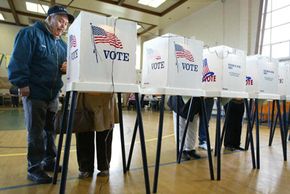Types of Primaries
A primary closely resembles a general election – when voters choose between candidates from each party for office. In a primary, however, the voter casts his or her vote to determine who will go onto the general election. This is a primary in a nutshell. Although primaries are more straightforward than caucuses – which also help choose a party's candidate for president – the primary process as a whole is somewhat convoluted.
Primaries can be closed or open. For simplicity's sake, let's start with the closed primary. In this type, only registered voters affiliated with a given party have the chance to go to the polls to cast their vote for their chosen candidate within that party. In closed primaries, only Republicans can vote for Republicans and Democrats for Democrats. Independent voters – those who have opted to choose neither party, but are registered voters – aren't allowed to cast a ballot. A closed primary can be modified to allow independents to cast a vote for a candidate from one party or another (this is called a semi-closed primary).
Advertisement
In open primaries, a voter can cast his or her ballot for either party. In most cases, the voter must choose a party to vote for by making a public statement at the polling station. In this circumstance, the voter will tell the election volunteer which party he or she chooses to vote for. He or she will then receive a ballot containing the candidates for that party. In some open primaries, voters may choose which party's candidate to vote for privately in the polling booth.
A third type of primary – the blanket primary – allows voters to vote for whomever they please, without having to affiliate with one party or another, and without making any kind of declaration. California and Washington were both using blanket primaries at the end of the 20th century, but stopped after a 2000 U.S. Supreme Court decision ruled them unconstitutional. It primarily survives in Louisiana in a form called the "nonpartisan blanket primary."
Whom would a blanket primary benefit? Aside from a last-minute change of heart at the polls, why would a Democrat vote for a Republican candidate or a Republican for a Democrat? The simple answer is strategy. Some voters use the primary to vote for the candidate of the other party that has the least chance of winning in the general presidential election. The reasoning goes that if enough voters from the opposite party vote for a lackluster candidate in enough primaries, that candidate will go on to win the opposing party's nomination for president. If this happens, then the disingenuous voters can cast their vote for their party's candidate in the general election, and their candidate will – hopefully – beat the lackluster candidate from the other party soundly.
Regardless of what kind of primary – or caucus – is used by a state, the point is to award delegates to candidates on their way to the national convention. So what's all this about delegates? Who are these people? Find out about the role of delegates on the next page.
